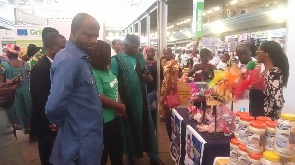 Osman Mamuda and others at the GrEEN Regional Trade show
Osman Mamuda and others at the GrEEN Regional Trade show
The Ashanti regional director for the Ministry of Trade and Industry, Osman Mamuda has urged Ghanaians to as a matter of urgency, develop a taste for what Ghana made goods.
To him, doing that is one of the best ways the country can rise to defeat the economic challenges in the country.
Touching on Ghana's economic struggles he said though there has been a sinking economy globally, one major factor that makes Ghana's economy to struggle more is the lack of taste for local goods and adequate industrialisation.
He said it is very sad that the lack of industrialisation makes the country depend so much on imports, and any country depending heavily on imported products risks its economy to weak currency, unemployment and poverty and these are threats to our national security.
By patronising what is made in Ghana, he said "we contribute to creating sustainable jobs for our youths and thereby creating wealth for Ghanaians. To promote Made in Ghana goods require us to buy, wear, eat and live with what is produced in Ghana".
According to him, another way we can promote viable businesses is by discouraging vices like workplace theft, reporting late to work and leaving early, loitering aimlessly and surfing on phones during busy hours of work. He said these act also contribute to killing of potentially viable businesses.
Osman Mamuda made this utterances while he was delivering a keynote address at the Kejetia Market Complex in Kumasi during a three day GrEEN Regional Trade Show which started on Friday, July 14, 2023.
The programme which is the third edition was organised by SNV Ghana in partnership with the Ministry of Trade and Industry, Ghana Enterprises Agency(GEA), Association of Ghana Industries (AGI) and Ghana Export Promotion Authority (GEPA).
The programme allows beneficiary SMEs to showcase their products and also serves as an avenue for businesses to build networks with their potential buyers and suppliers both in finished goods and raw materials.
In part of the directors keynote address, he said the government was committed to ensuring that all industrialisation related activities are being pushed to help the country reach its dream.
He said one of the pillars of the government's industrialization agenda is the implementation of the IDIF which hangs on five (5) key objectives which include; creation of mass employment for Ghanaians, spread development across the country, add value to our natural resources, import substitution and the creation of wealth for Ghanaians.
He said, another aspect of the Industrialisation Agenda is Export Diversification where government is seeking to increase the export earnings by increasing both the scope and volumes of our Non Traditional Exports (NTEs).
"In view of this, government has signed unto some agreements which is aimed at giving Ghanaian businesses access to some foreign markets. One of these agreements is the African Continental Free Trade Area Agreement (AfCFTA)", he said.
He has therefore encouraged all business owners, especially those in the manufacturing/value addition and agro processing sectors to take advantage of the African Continental Free Trade Area Agreement (AfCFTA) to build and market their products and services across Africa.
For her part, Genevieve Parker- Twum, who is a staff at the SNV/Green Project, expressed joy over how SMEs had taken opportunity to utilise the project.
Explaining into details, she said SNV/GrEEN Project provides free training and guidelines for SMEs for at least six(6) months. Apart from that, they also help the SMEs in registering their companies(products) with the regulatory bodies such as FDA, Ghana Standard Board, EPA etc.
According to her, beneficiaries are usually taught how to keep records and upgrade their businesses without incurring lost.
"We know capital to start businesses are usually difficult but after we guide them to know how to keep records, they're able to secure loans. Sometimes some of these SMEs can form an association that will make them very strong to form a front that will grant their requests with ease. Sometimes we organise GrEEN Innovative Challenge and those who participate are usually giving capital to cushion them", she explained.
She further stated that the major aim of the SNV / GrEEN Project is to guide people on how they can progress in their businesses and to make money other than always giving them capital. She said through the support which is usually given, the major aim was to train people on how to make money through their business success.
The showcase programme saw numerous SMEs and business owners who are beneficiaries of the project troop into the new Kejetia market to display their projects.
Some beneficiary business owners who came to showcase their products expressed joy and commended the NGO for the free training. According to most of them, the training has helped them acquire lots of skills, and some of them who already have a knowledge about something have upgraded themselves. They however appealed for much capitals from individuals, partners etc so that they can enlarge their businesses after the training.
Some production fields displayed include, bead production in different forms, mushroom production including drinks etc, soap production, charcoal lighter, agro processing and many others.